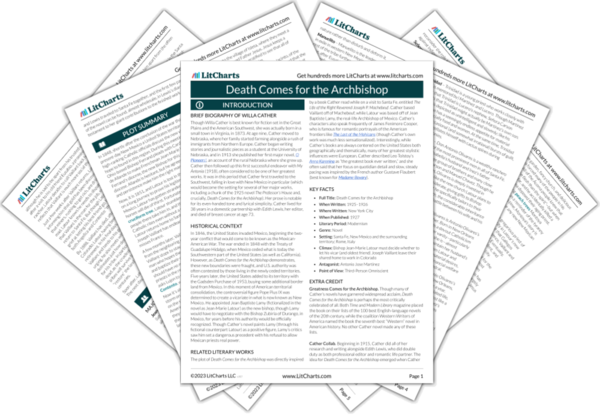Antonio Jose Martínez Quotes in Death Comes for the Archbishop
[Martínez’s face] was so unusual that he would be glad to see it again; a high, narrow forehead, brilliant yellow eyes set deep in strong arches, and full, florid cheeks,—not blank areas of smooth flesh, as in Anglo-Saxon faces, but full of muscular activity, as quick to change with feeling as any of his features. His mouth was the very assertion of violent, uncurbed passions and tyrannical self will; the full lips thrust out and taught, like the flesh of animals distended by fear or desire.
Father Latour judged that the day of lawless personal power was almost over, even on the frontier, and this figure was to him already like something picturesque and impressive, but really impotent, left over from the past.
The swarthy Padre laughed, and threw off the big cat which had mounted to his shoulder. “It will keep you busy, Bishop. Nature has got the start of you here. But for all that, our native priests are more devout than your French Jesuits. We have a living church here, not a dead arm of the European church. Our religion grew out of the soil, and has its own roots. We pay a filial respect to the person of the Holy Father, but Rome has no authority here. We do not require aid from the Propaganda, and we resent its interference. The Church the Franciscan Fathers planted here was cut off; this is the second growth, and it is indigenous. Our people are the most devout left in the world.”
Bishop Latour had one very keen worldly ambition: to build in Santa Fé a cathedral which would be worthy of a setting naturally beautiful. As he cherished this wish and meditated upon it, he came to feel that such a building might be a continuation of himself and his purpose, a physical body full of his aspirations after he had passed from the scene.

Antonio Jose Martínez Quotes in Death Comes for the Archbishop
[Martínez’s face] was so unusual that he would be glad to see it again; a high, narrow forehead, brilliant yellow eyes set deep in strong arches, and full, florid cheeks,—not blank areas of smooth flesh, as in Anglo-Saxon faces, but full of muscular activity, as quick to change with feeling as any of his features. His mouth was the very assertion of violent, uncurbed passions and tyrannical self will; the full lips thrust out and taught, like the flesh of animals distended by fear or desire.
Father Latour judged that the day of lawless personal power was almost over, even on the frontier, and this figure was to him already like something picturesque and impressive, but really impotent, left over from the past.
The swarthy Padre laughed, and threw off the big cat which had mounted to his shoulder. “It will keep you busy, Bishop. Nature has got the start of you here. But for all that, our native priests are more devout than your French Jesuits. We have a living church here, not a dead arm of the European church. Our religion grew out of the soil, and has its own roots. We pay a filial respect to the person of the Holy Father, but Rome has no authority here. We do not require aid from the Propaganda, and we resent its interference. The Church the Franciscan Fathers planted here was cut off; this is the second growth, and it is indigenous. Our people are the most devout left in the world.”
Bishop Latour had one very keen worldly ambition: to build in Santa Fé a cathedral which would be worthy of a setting naturally beautiful. As he cherished this wish and meditated upon it, he came to feel that such a building might be a continuation of himself and his purpose, a physical body full of his aspirations after he had passed from the scene.











